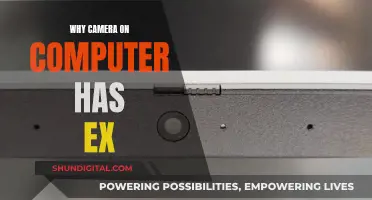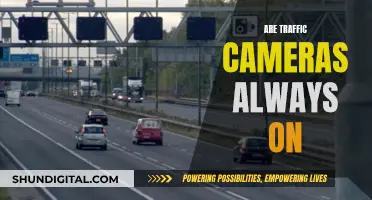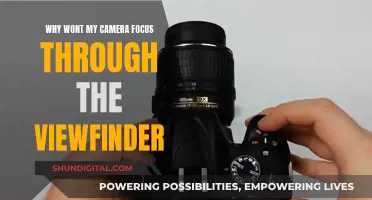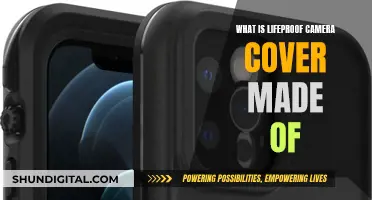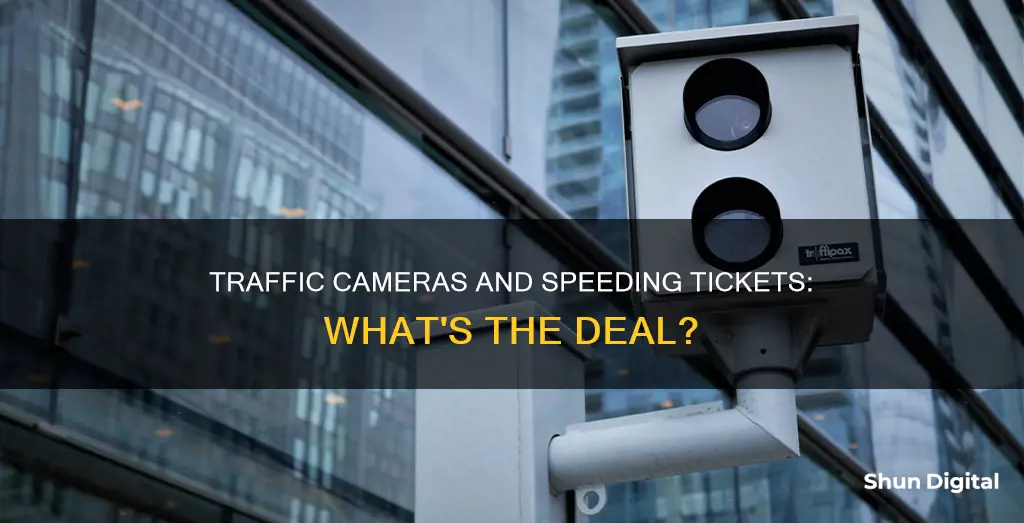
Traffic cameras are an increasingly common feature of roads in many countries, and they are used to monitor and enforce compliance with road rules. These cameras can be used to detect speeding, running red lights, unauthorized use of bus lanes, and more. When a violation is detected, a citation is typically mailed to the registered owner of the vehicle, who is presumed to be the driver unless proven otherwise. While some states and countries prohibit the use of traffic cameras for issuing speeding tickets, many others allow their use with certain restrictions. The effectiveness of speed cameras in reducing accidents and improving road safety has been well-documented, but they have also faced opposition and legal challenges over privacy concerns, revenue-raising, and other issues.
| Characteristics | Values |
|---|---|
| Purpose | To detect and record traffic violations |
| Camera Type | Red light cameras, speed cameras, traffic sensor cameras, automated number plate recognition (ANPR) cameras |
| Camera Appearance | Dome or cylinder-shaped, mounted on top of traffic signals or light poles, enclosed in a weatherproof covering |
| Functionality | Combine radar technologies that measure speed with a camera, capture images or videos of violations |
| Ticket Process | A citation is mailed to the registered owner of the vehicle, who can then pay the fine or contest the ticket |
| Legality | Varies by state or jurisdiction; some states prohibit their use, while others allow them with certain restrictions |
| Effectiveness | Studies show a reduction in crashes, injury crashes, and fatal or serious injury crashes due to speed cameras |
What You'll Learn

Legality of traffic cameras
The legality of traffic cameras, specifically red light and speed cameras, varies across different states and jurisdictions. While some states have banned their use, others have implemented them to varying degrees.
States with Speed Cameras
Alabama, Arizona, California (from 2024), Colorado, Connecticut, Delaware (trial), the District of Columbia, Florida, Georgia, Hawaii (pilot), Illinois, Indiana (pilot), Iowa (local ordinances), Louisiana, New Jersey (pilot), New Mexico (local), New York (school zones), North Carolina, Ohio, Oregon, Pennsylvania (work zones), Rhode Island (school zones), Tennessee, Texas, Utah (school zones), Virginia (school and work zones), Washington, and Wisconsin.
States with Red Light Cameras
Alabama, Arizona, Arkansas (limited), California, Colorado (limited), Connecticut, Delaware, the District of Columbia, Florida, Georgia, Hawaii (pilot), Illinois (local ordinances), Indiana, Iowa (local ordinances), Louisiana, Maryland, Massachusetts, Michigan, Minnesota, Mississippi, Missouri, Nebraska, Nevada (limited), New Hampshire, New Jersey (formerly), New Mexico (local), New York (local), North Carolina, Ohio, Oregon, Pennsylvania (cities >20k population), Rhode Island, South Carolina (emergency), Tennessee, Texas, Utah (limited), Virginia, Washington, and Wisconsin.
States with Bans on Speed Cameras
Arkansas (except school, railroad, and highway work zones with police present), Mississippi, Montana, Nevada, New Hampshire, New Jersey, New York, South Dakota, Utah, West Virginia, and Wisconsin.
States with Bans on Red Light Cameras
Maine, New Jersey, South Carolina (except emergencies), Texas, and West Virginia.
States with No Specific Laws on Traffic Cameras
Alaska, Idaho, Kansas, Kentucky, New Mexico, North Dakota, Oklahoma, Vermont, and Wyoming.
Constitutionality and Privacy Concerns
The use of traffic enforcement cameras has been contested by attorneys on constitutional and privacy grounds, leading to numerous court decisions and statutes governing their use. While some jurisdictions, like Missouri, have found automated citations to be unconstitutional, most courts have ruled that red light and speed cameras do not violate drivers' constitutional rights.
State Law Restrictions and Requirements
States that permit traffic cameras often impose restrictions and requirements on their use. For example, their use may be limited to certain areas, such as school or construction zones, and warning signs must be posted to notify drivers of their presence.
iCloud Cameras Stuck in Night Mode: Here's Why
You may want to see also

How traffic cameras work
Traffic cameras are used to enforce traffic laws and can be used to catch drivers who fail to pay tolls, don't stop for school buses, or disobey railroad crossing signals. The two most common types of traffic ticket cameras are red light cameras and speed cameras.
How Traffic Ticket Cameras Work
Red light cameras are set up at intersections to catch drivers who run the signal. A sensor estimates the speed of the vehicle as it approaches the intersection. If the vehicle is going too fast to stop when the light turns red, the camera is triggered to take a picture and/or video. The camera captures the date, time, and location of the violation, as well as the vehicle's license plate number.
Speed cameras utilize radar equipment that is linked to the camera and are usually set up near school zones or areas where drivers often exceed the speed limit. When the radar detects a vehicle that is speeding, the camera is triggered to take a picture of the vehicle, along with its speed, the date, time, location, and the vehicle's plate number.
How States Use Traffic Enforcement Cameras
Traffic ticket camera laws vary by state. Some states prohibit their use entirely, while others don't address their use at all. Many states allow traffic cameras but impose restrictions and requirements for their use, such as limiting their use to certain areas like school or construction zones. In states that allow traffic enforcement cameras, warning signs must be posted to indicate that compliance with traffic laws is being enforced with cameras.
The Ticketing Process
The ticketing process for traffic cameras is not entirely automated. After a traffic camera captures photos and/or video footage of a violation, a person—typically a police officer—reviews the footage and decides whether to issue a ticket. The registered owner of the vehicle then receives the citation by mail within a certain period. The owner typically has the option to pay the fine or contest the citation in court or in writing.
Charging Your Vivitar Camera: A Step-by-Step Guide
You may want to see also

How to fight a ticket
Examine Your Ticket
Check the date, time, and location of the ticket. Because camera tickets are sent to the owner of the car, ensure that you were driving the car when the ticket was issued. In some states, the driver must be identified for the ticket to be valid. If someone else borrowed your car, you may not be liable.
Plead Not Guilty
You must plead not guilty if you want to dispute the ticket. Some jurisdictions allow you to respond to the citation by mail, online, or in person. Check your citation and make sure you plead not guilty before the deadline, typically within 30 days.
Request a Formal Hearing
When you plead not guilty, demand a full formal hearing or trial. This may require you to attend other hearings, such as pre-trial hearings or mediation, but don't accept anything less than a full dismissal of your ticket.
Research Applicable Law
Look for cases in your city or county about traffic cameras and see if any appellate court decisions have ruled on the legality of camera tickets. There may be recognised defences, such as the necessity to speed in an emergency, or improperly placed or absent warning signs.
Gather Evidence
Request production of documents from the local police department or law enforcement agency in charge of the camera. This includes photos, maintenance records, and speed monitoring system records. Also, obtain statements from any passengers or witnesses who can support your case.
Attend the Hearing
Arrive at the courthouse with copies of any documents you intend to use as evidence. Treat the judge and courthouse staff with respect, and listen quietly while the prosecutor presents their case, making notes on any points you wish to address.
Challenge the Evidence
You can dispute the admissibility of the photograph as hearsay, or assert your right to confront witnesses. You may also dispute the authenticity of the photograph by challenging the accuracy of the camera and requesting maintenance and calibration records. If the photos are clear but don't show you driving, you can argue that the prosecution can't prove it was you.
How Adobe Camera Raw Fixes Distortion Issues
You may want to see also

Privacy concerns
The use of traffic cameras has raised several privacy concerns. While these cameras are intended to deter traffic-related crime and enhance safety and security, some people worry about the potential for ""mission creep",", or the use of data collected by these cameras for purposes beyond tracking reckless drivers. This is a valid concern, as government and private-industry surveillance techniques are rarely restricted to their original purpose, and each new use of the data opens the door to more privacy abuses.
One of the most significant privacy concerns is the storage of data by government entities, including information about a driver's whereabouts, whether or not they were issued a citation, and the outcome of any appeals. This data should be inaccessible for any purpose other than issuing a citation and should be destroyed as soon as possible. However, this is not always the case, and the retention and use of this data can infringe on individuals' privacy.
Another issue is the potential for false accusations or violations of due process. In some cases, the registered owner of a vehicle may receive a citation even if they were not the one driving, and the burden of proof falls on them to prove their innocence. This can be challenging, especially if the ticket is mailed out weeks after the violation occurred, making it difficult for the owner to remember the circumstances or mount a defence. This presumption of guilt over innocence is a violation of a fundamental American legal principle.
Furthermore, there are questions about the fairness and accuracy of these systems. For example, in San Diego, a court held that the evidence from red-light cameras was unreliable. There are also concerns about the choice of intersections where these cameras are installed and the timing of yellow lights, which may be influenced by a desire to maximise ticket revenue rather than improve traffic safety.
The use of automated traffic cameras has also been challenged on constitutional grounds, with attorneys arguing that they violate the constitutional rights of drivers. While most courts have upheld the use of these cameras, some jurisdictions, like Missouri, have found automated citations to be unconstitutional.
Smartphone Cameras: Which Devices Shoot Raw?
You may want to see also

Effectiveness of traffic cameras
Traffic cameras are used to enforce traffic laws and can be an effective way to monitor traffic speeds and conditions. They can also be used to detect and record traffic violations such as running red lights or speeding. While traffic cameras can be an effective tool for law enforcement, there are varying opinions on their effectiveness in improving road safety.
Traffic cameras are an effective way to monitor traffic and enforce road laws. They can detect and record traffic violations, such as running red lights or speeding, and are often used as evidence for issuing tickets. The use of traffic cameras varies by state, with some prohibiting their use entirely, while others allow them with certain restrictions. In most cases, a police officer will review the footage and make the final decision on whether to issue a ticket.
Red light cameras are typically placed at busy intersections to capture drivers who enter on a red light. These cameras can take multiple images or videos of the violation, capturing the date, time, location, and vehicle license plate number. Speed cameras, on the other hand, are usually set up near school or work zones and use radar technology to detect vehicles exceeding the speed limit. They capture similar details to red light cameras, including the speed of the vehicle.
The presence of traffic cameras can act as a deterrent, encouraging drivers to follow the rules to avoid fines. For example, a study in Virginia found that red light cameras reduced the number of drivers running red lights by 67%. However, the effectiveness of traffic cameras in improving road safety is debated. While they may reduce certain types of accidents, such as "T-bone" collisions at intersections, they may also increase the number of rear-end accidents as drivers suddenly stop to avoid a fine.
In a study examining traffic accidents in three large Texas cities over 12 years, researchers found no evidence that red light cameras improved public safety. When the cameras were removed in Houston, angle accidents (those caused by running a red light) increased by 26%, but all other types of accidents decreased by 18%. This suggests that the negative effects of the cameras outweighed their benefits.
Additionally, there are concerns about the constitutionality and fairness of traffic cameras. Some argue that they violate the constitutional rights of drivers, and there have been legal challenges to their use. In some cases, tickets issued solely based on camera evidence may not hold up in court, as drivers have the right to face their accuser.
In conclusion, while traffic cameras can be an effective tool for enforcing traffic laws and deterring violations, their effectiveness in improving overall road safety is questionable. They may reduce certain types of accidents while increasing others, and their use remains controversial in some jurisdictions.
The SX-70 Polaroid Camera: A Revolutionary Invention of 1972
You may want to see also
Frequently asked questions
Yes, traffic cameras can be used to give speeding tickets. These are usually set up near school zones or areas where drivers often exceed the speed limit.
Traffic cameras use radar equipment that is linked to the camera to detect speeding violations. When the radar detects a vehicle exceeding the speed limit, it triggers the camera to take a picture of the vehicle, along with its speed, the date, time, location, and license plate number.
If you receive a traffic camera speeding ticket, it's important to review the information provided and understand your options. You may be able to pay the fine or contest the ticket in court or in writing, depending on the laws in your state.




